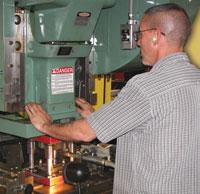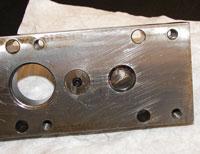Press Department Supervisor
- FMA
- The Fabricator
- FABTECH
- Canadian Metalworking
Categories
- Additive Manufacturing
- Aluminum Welding
- Arc Welding
- Assembly and Joining
- Automation and Robotics
- Bending and Forming
- Consumables
- Cutting and Weld Prep
- Electric Vehicles
- En Español
- Finishing
- Hydroforming
- Laser Cutting
- Laser Welding
- Machining
- Manufacturing Software
- Materials Handling
- Metals/Materials
- Oxyfuel Cutting
- Plasma Cutting
- Power Tools
- Punching and Other Holemaking
- Roll Forming
- Safety
- Sawing
- Shearing
- Shop Management
- Testing and Measuring
- Tube and Pipe Fabrication
- Tube and Pipe Production
- Waterjet Cutting
Industry Directory
Webcasts
Podcasts
FAB 40
Advertise
Subscribe
Account Login
Search
Your press is talking. Are you listening?
How to head off potential problems by tuning in to 7 sounds
- By David Klemm
- April 27, 2012
- Article
- Bending and Forming

All machines have a story to tell. Most times, if you listen, the machine will tell you what’s wrong. Here, a banging knockout bar indicated that the knockout tooling was dragging on the punch.
Editor’s Note: This guest column is written by David Klemm, who is the press department supervisor for Solon Manufacturing Co. He has worked in manufacturing for 27 years—all of that time in the punch press department—running and supervising presses ranging from a 200-ton Minster to custom 60-ton machines. In this article he shares some of what he has learned.
All machines have a story to tell if you only listen. Punch presses talk every day. Are you listening?
My operators and I can almost always tell you when a machine is starting to make bad parts. You might think this sounds crazy or even egotistical. I assure you, it is not. Years of experience have taught me that every sound tells a story.
The benefits of catching problems before they happen is immeasurable in this day and age of just-in-time manufacturing. Companies cannot afford to have a machine down for days to make a major repair—a repair that could have been minor or even eliminated if they had been listening to the changing voice of the machine.
It is vital to learn to listen to the presses. Each machine has a distinct voice that it talks in every day, and just like humans, its voice changes when it gets sick. Most times, if you listen, the machine will tell you what’s wrong.
If you woke up in the morning with a stuffy nose, you would start taking some measures to prevent the onset of the cold from getting worse. In the same way, you can often head off a major problem with the machine by listening.
Although preventive maintenance is a must in any working environment, it cannot possibly help your company prevent all mechanical problems. Listening to your machines and operators is imperative if you want to keep your company running smoothly.
Sometimes, in a noisy shop environment, the only time to hear the problem is when most of the machines are not running. Of course, this is not always possible if the company runs three shifts. If your company runs only one shift, it is advisable to listen closely to the machine at start-up or shutdown.
Sounds of the Press
1. Hissing of an Air Leak. We have two 100-ton presses that we use daily to stamp our product. From experience, I could tell that the voice of the machine had changed. We heard a small, pesky air leak that we kept ignoring until the pipe to the counterbalance cracked. We were faced with a two-day loss of time on that machine. If we had ordered parts, and started planning repair time, we would have lost only four hours.
2. Rattle of a Failing Bearing. As we were shutting down our machines at closing one day, we noticed that one of the oil pumps was making a different noise. It sounded like small marbles rattling around in an empty pop can. We recognized it as the sound of one of the bearings about to go. Because we heard this problem ahead of time, we were ahead of the curve and acquired another pump, so it was ready to go. The only downtime was for pump replacement, which could not be avoided, but not the time to get the pump ordered and shipped.
3. High Pitch of Cracked Tooling. The press is not always the only thing that will talk to you; sometimes the tooling will talk to you too.
Cracked dies and chipped punches make a different sound than tooling that is unblemished by defect. Sometimes the difference in sound is so subtle that you are tempted to ignore it. Don’t! The cost is too high.
For example, we were running a high-volume, single-stroke job. An operator heard a dual hit on the punching operation that wasn’t there before. We immediately shut down the press, pulled the die set, and found that although the punch was still in the holder, it had broken off at the base. The punch was literally moving up and down in the holder. The problem was caught early because the operator heard the changing voice of the machine. Therefore, we were able to correct the problem beforehand to prevent blanking bad parts.
4. Double-clicking of a Die Set. I was crossing the shop one day and I heard a double-clicking noise from one of the presses. The noise instantly said to me that the top was loose on the die set, causing the die to bang against the ram of the machine on the upstroke. All it took to solve the problem was to tighten four bolts.
An extra click could mean loose bolts, failed tooling, or a problem that could prove dangerous to the operator. As supervisors, owners, and operators, we must make safety of the personnel the No. 1 priority!
5. Insufficient Lubrication. A constant or intermittent squeak might mean a lack of lubrication that could cause early die failure.
6. Snap of Improper Die Clearance. If you hear a snapping sound when running a compound job, it usually signifies that improper die clearance is causing the knockout to distort the part on ejection. Catching this problem during setup will prevent having to scrap parts and tooling.
7. Sound of Silence. One of the trickier things to listen for is no sound. Although it may seem easy to detect, if your shop is running multiple jobs, you won’t always pick up the silence. That is why being in tune with the machines is a must.
I was doing paperwork at my desk and ran out into the shop because I picked up on an absence of sound. Sometimes this absence of sound is easily explained, such as when a batch is complete. At other times, though, it is caused by the machine punching air because of a misfeed.
Listening Is for Supervisors Too
Listening is a skill that is acquired with practice, time, and training, I have learned. I think that listening should be included in the training of new operators. They must know not only how to run the press, but listen to it, because every noise means something.
Operators must be encouraged to listen to the changing voice of the machines. After all, most supervisors are not on the floor, by any one machine, for long. They must be encouraged to share what they hear without being ignored or having their judgment dismissed. A competent operator who works on the same machine every day can tell you in a minute when something is different. When they say something is wrong, listen.
Supervisors should be listening, too, because sometimes machine operators become so overwhelmed that they ignore or do not hear what their machine is saying to them. A noise that is screaming out a problem can be missed, especially by untrained operators.
If a potential problem is heard soon enough, parts can be ordered for the repair, time can be allotted, and planning can make sure that lost production time is minimized—or better yet, prevented altogether.
About the Author
David Klemm
425 Center St.
Chardon, OH 44024
440-286-714
subscribe now

The Fabricator is North America's leading magazine for the metal forming and fabricating industry. The magazine delivers the news, technical articles, and case histories that enable fabricators to do their jobs more efficiently. The Fabricator has served the industry since 1970.
start your free subscription- Stay connected from anywhere

Easily access valuable industry resources now with full access to the digital edition of The Fabricator.

Easily access valuable industry resources now with full access to the digital edition of The Welder.

Easily access valuable industry resources now with full access to the digital edition of The Tube and Pipe Journal.
- Podcasting
- Podcast:
- The Fabricator Podcast
- Published:
- 04/16/2024
- Running Time:
- 63:29
In this episode of The Fabricator Podcast, Caleb Chamberlain, co-founder and CEO of OSH Cut, discusses his company’s...
- Trending Articles
AI, machine learning, and the future of metal fabrication

Employee ownership: The best way to ensure engagement

Steel industry reacts to Nucor’s new weekly published HRC price

Dynamic Metal blossoms with each passing year

Metal fabrication management: A guide for new supervisors

- Industry Events
16th Annual Safety Conference
- April 30 - May 1, 2024
- Elgin,
Pipe and Tube Conference
- May 21 - 22, 2024
- Omaha, NE
World-Class Roll Forming Workshop
- June 5 - 6, 2024
- Louisville, KY
Advanced Laser Application Workshop
- June 25 - 27, 2024
- Novi, MI



























